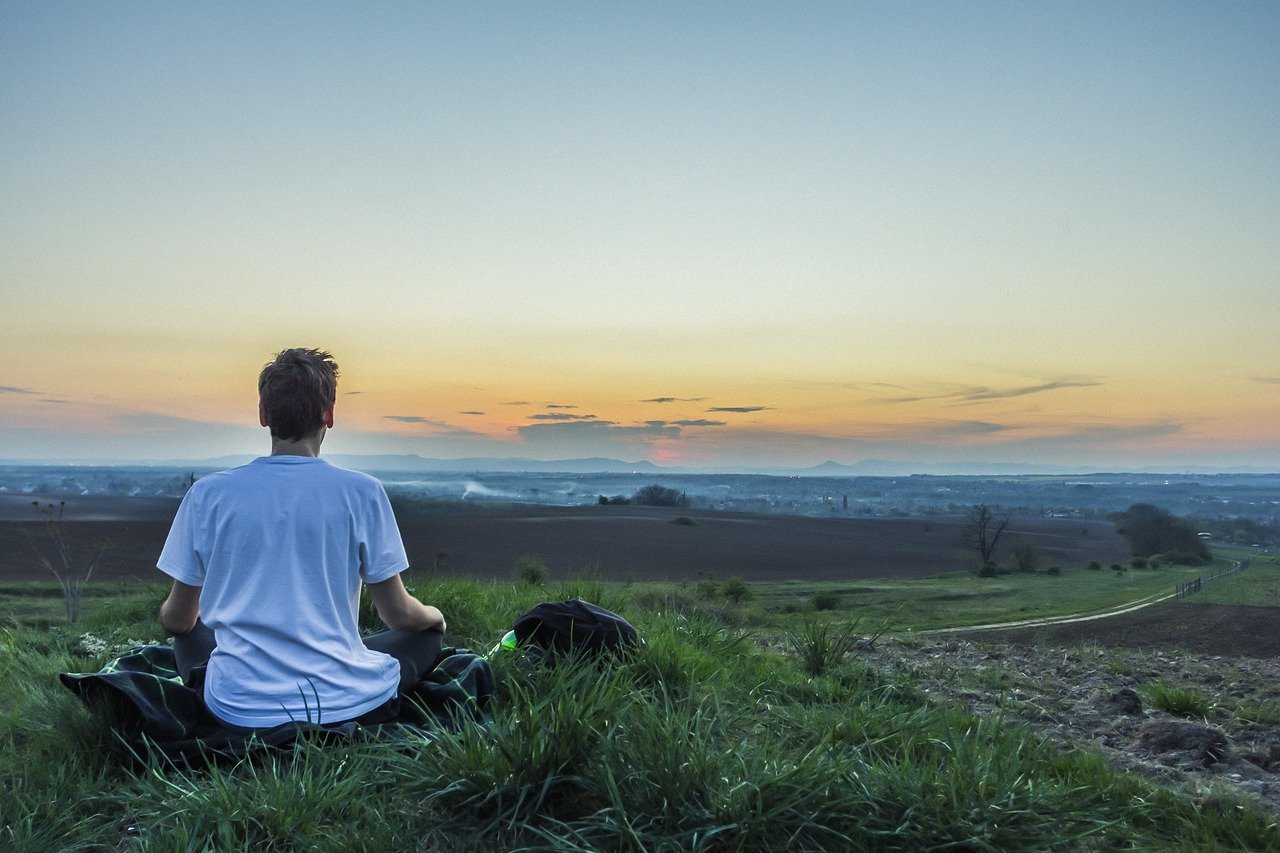You can’t stop the waves, but you can learn to surf.
-Jon Kabat-Zinn
Modern meditation is closely linked to Zen Buddhism practices. In fact, mindfulness is based on the Buddhist word “Sati,” or “moment-to-moment awareness of present events.” Sati is the first factor of the Seven Factors of Enlightenment, a core belief in Buddhism.
In 1967 renowned monk and author Shunryu Roshi famously founded the first Zen monastery outside of Asia. He enjoyed popularity in San Francisco where he taught meditation and among Buddhists and New Agers.
But in general, meditation didn’t become mainstream in the West until the development of Mindfulness Based Stress Reduction (MBSR) in the 1980s.
MBSR is an eight-week class developed by Dr. Jon Kabat-Zinn that trains people to manage stress, anxiety, depression, and pain with meditation.
MBSR owes its success in part to Dr. Kabat-Zinn’s attempt to separate MBSR from Buddhism or other spiritual beliefs. This allowed it to be adapted by the secular world, and MBSR has since spread globally and is widely taught in healthcare facilities, schools, prisons, and other institutions. It is clinically researched and proven to be effective for pain management and depression/anxiety symptoms.
Busy 21st century lifestyles have resulted in more reported stress and anxiety. Mindfulness is one solution that can be practiced by nearly everyone.
21st century lifestyles have resulted in more reported stress and anxiety. Mindfulness is one solution that can be practiced by nearly everyone. And while formal mindfulness training can be helpful, it isn’t necessary to enjoy the benefits. By being in the moment you are being mindful.
A popular study tracked over 2,000 adults with an iPhone app. The object of the study was to capture people’s thoughts and feelings during daily activities in real time. What they discovered was that people’s minds wandered almost 50% of the time, and that mind wandering caused a dip in reported mood, regardless of the circumstances.
Mindfulness doesn’t just affect our internal state. Several studies have shown meditation can affect how we handle our relationships. This study even found that people who meditate show less racial bias.

Notable Mindfulness Studies
Research on mindfulness is still developing as the field is considered new and more studies need to be done. The Harvard Gazette has reported that studies on mindfulness grew from only one in 1995 to 216 in 2015. That’s not many, but the research is promising and many of these studies suggest that mindfulness is a useful treatment for multiple issues.
- MBSR programs have been found to be nearly as effective as antidepressants for treating psychological stress. They are particularly effective for people with severe depression. Mindfulness Based Cognitive Therapy has been shown to reduce relapse of symptoms by up to 60%, and this is regardless of age, sex, and other factors.
- Just 15 minutes of mindfulness a day can treat autoimmune symptoms and lead to a meaningful decrease in blood pressure. There are several studies showing benefits against an array of physical health conditions.
- According to one study mindfulness can prevent memory loss in people under severe stress.
- People who meditate have significantly more flu antibodies than their non-meditating peers after receiving a flu vaccine. A boosted immune system may explain why psoriasis treatments have been found to be more effective in meditators.
- A review of 34 randomized controlled trials shows that mindfulness can help ease addiction.
- 23 studies on work-based mindfulness programs found that after their training, employees experienced fewer symptoms of anxiety, stress, and psychological distress. They also experienced better sleep quality and greater overall well-being.
- Mindfulness programs have become popular in the school setting. One study reports that mindfulness-based interventions for children can increase their learning abilities.
Ready to get started? There are lots of books and articles on mindfulness, but the best way to learn about it is to try it for yourself. There are lots of apps, videos, and programs to help you on your journey. Here are some of our favorites:

Mindfulness Websites
Mindful – A large public-benefit corporation offering an extensive collection of content, courses, training, and directories. They have something for everyone and their selection of free guided meditations is impressive.
Tiny Buddha – Features stories, insights, and tips from contributors all around the world. They also have an active social media presence and a forum where visitors can seek and offer support.· Websites like Headspace and Calm and are popular, but a higher percentage of their content is behind a paywall.
Websites like Headspace and Calm and are popular and have great meditations, but a higher percentage of their content is behind a paywall.
Mindfulness Apps
Smiling Mind – Originally designed for teens, they’ve since expanded to included meditations for everyone, though their content is still divided by age. Simple, user-friendly design.
Calm – Huge app with over 100 million downloads and more than 700,000 5-star reviews. They offer free guided meditation and stories narrated by celebrities.·
Insight Timer – At 30,000 videos, they have the largest selection of free meditations. The app also has music and messages from top meditators. The best place to find free guided meditations for wherever you are in life.
Guided Breath Meditation Videos
Breath meditation is where you focus on your breathing. It’s simple and one of the most widely practiced forms of meditation. Here are some breath meditations to get you started:
- People new to mindfulness or short on time will appreciate this 90-second meditation.
- Check out The American Lung Association’s guided exercises to help manage stress.
- This 30-minute meditation by renowned author and spiritual teacher Eckhart Tolle focuses on presence and breath.
Guided Body Scanning Videos
Body scanning is where you pay attention to parts of your body and any bodily sensations in sequence from head to toe. Body scans can help you become more aware of your physical, emotional, and spiritual self.
- A popular guided body scan with over 2 million views on YouTube and overwhelmingly positive comments.
- Our guided body scan is 4 minutes and good for beginners or anyone short on time.
- The Compassionate Body Scan is $3.99 and is a short, downloadable audio that’s great for beginners.
Ready to dive deeper? If you’re looking for formal mindfulness training, these courses are for you.
MBSR and extended meditation trainings:
Body and Mind Are One with Thich Nhat Hanh
The MBSR Online Course: An 8-Week Training in Mindfulness-Based Stress Reduction
The MBSR Online Course: An 8-Week Training in Mindfulness-Based Stress Reduction (CE Credits)
The MBSR Home Study Course
Mindfulness Daily Free
Mindfulness Daily at Work Free




